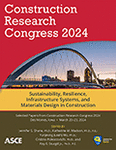Circular Economy Strategies for Decarbonization of the Built Environment Value Chain Scope 3 Emissions: A Network Analysis
Publication: Construction Research Congress 2024
ABSTRACT
With the anticipated growth in construction activities, minimizing value chain emissions, including those attributed to activities beyond an organization’s direct control—aka “Scope 3” emissions, and adopting circular economy (CE) practices have become critical to attaining the 2050 climate goals. Extant literature lacks a value-chain-comprehensive set of CE strategies on one hand, and an analysis of their actual project applications on the other. This research aims to build a holistic portfolio of CE actionable strategies that span across the entire built environment value chain, analyzing their extent of implementation and interlinkages within the literature versus actual projects. To this end, the authors conducted a systematic literature and practice review to extract and collate CE strategies and project case studies, and quantified the implementation frequency for each of the strategies and their interlinkages through a network analysis. Results revealed a broad yet fragmented implementation, with the most frequently implemented strategies including requiring sustainability ratings, passive design measures, and landfill diversion, whereas strategies targeting logistics and property market phases were rather scarce. Ultimately, the findings herein can serve as a foundation for a multifunctional database of value chain-specific strategies and case studies that can guide the industry on its track to decarbonization.
Get full access to this article
View all available purchase options and get full access to this chapter.
REFERENCES
Adams, K. T., M. Osmani, T. Thorpe, and J. Thornback. 2017. “Circular economy in construction: current awareness, challenges and enablers”. In Proceedings of the Institution of Civil Engineers-Waste and Resource Management. (Vol. 170, No. 1, pp. 15–24). Thomas Telford Ltd.
Blomsma, F., and G. Brennan. 2017. “The emergence of circular economy: a new framing around prolonging resource productivity”. Journal of Industrial Ecology. 21(3), 603–614.
Çetin, S., C. De Wolf, and N. Bocken. 2021. “Circular digital built environment: An emerging framework”. Sustainability. 13(11), 6348.
Cruz Rios, F., D. Grau, and M. Bilec. 2021. “Barriers and enablers to circular building design in the US: an empirical study”. Journal of Construction Engineering and Management. 147(10), 04021117.
Dewagoda, K. G., S. T. Ng, and J. Chen. 2022. “Driving systematic circular economy implementation in the construction industry: A construction value chain perspective.” Journal of Cleaner Production. 381, 135197.
Eberhardt, L. C. M., M. Birkved, and H. Birgisdottir. 2020. “Building design and construction strategies for a circular economy.” Archit. Eng. Des. Manag. 0, 1–21.
Eissa, R., M. S. Eid, and E. Elbeltagi. 2021. “Current applications of game theory in construction engineering and management research: a social network analysis approach.” Journal of Construction Engineering and Management. 147(7), 04021066.
El-adaway, I. H., G. G. Ali, R. Eissa, M. Abdul Nabi, M. O. Ahmed, T. Elbashbishy, and R. Khalef. 2023. “Journal of construction management and economics 40th anniversary: investigating knowledge structure and evolution of research trends.” Construction Management and Economics. 1–23.
Gallego-Schmid, A., H. M. Chen, M. Sharmina, and J. M. F. Mendoza. 2020. “Links between circular economy and climate change mitigation in the built environment.” Journal of Cleaner Production. 260, 121115.
Guerra, B. C., S. Shahi, A. Mollaei, N. Skaf, O. Weber, F. Leite, and C. Haas. 2021. “Circular economy applications in the construction industry: a global scan of trends and opportunities.” J. Clean. Prod. 324, 129125.
IPCC (Intergovernmental Panel on Climate Change). 2022. Climate Change 2022: Impacts, Adaptation, and Vulnerability. Cambridge University Press, Cambridge, UK and New York, NY, USA, 3056.
Lopez Ruiz, L. A., X. Roca Ramon, and S. Gasso Domingo. 2020. “The circular economy in the construction and demolition waste sector – A review and an integrative mode approach.” J. Clean. Prod. 248, 119238.
Malmqvist, T., M. Nehasilova, A. Moncaster, H. Birgisdottir, F. Nygaard Rasmussen, A. Houlihan Wiberg, and J. Potting. 2018. “Design and construction strategies for reducing embodied impacts from buildings – Case study analysis.” Energy Build. 166, 35–47.
Nußholz, J., S. Çetin, L. Eberhardt, C. De Wolf, and N. Bocken. 2023. “From circular strategies to actions: 65 European circular building cases and their decarbonisation potential.” Resources, Conservation & Recycling Advances. 200130.
Pomponi, F., and A. Moncaster. 2016. “Embodied carbon mitigation and reduction in the built environment – What does the evidence say?”. J. Environ. Manage. 181, 687–700.
Röck, M., M. R. M. Saade, M. Balouktsi, F. N. Rasmussen, H. Birgisdottir, R. Frischknecht, and A. Passer. 2020. “Embodied GHG emissions of buildings–The hidden challenge for effective climate change mitigation”. Applied Energy. 258, 114107.
UNEP (United Nations Environment Programme). 2021. Catalysing Science-based Policy action on Sustainable Consumption and Production – The value-chain approach & its application to food, construction and textiles. UNEP, Nairobi.
UNEP (United Nations Environment Programme). 2022. Global status report for building and construction. UNEP, Nairobi.
WBCSD (World Business Council for Sustainable Development) and WRI (World Resources Institute). 2004. The greenhouse gas protocol. A corporate accounting and reporting standard. Rev. ed. Washington, DC, Conches-Geneva.
WBCSD. 2021. Decarbonizing construction: guidance for investors and developers to reduce embodied carbon. WBCSD, Geneva, Beijing, Delhi, London, New York, Singapore.
Information & Authors
Information
Published In
History
Published online: Mar 18, 2024
Authors
Metrics & Citations
Metrics
Citations
Download citation
If you have the appropriate software installed, you can download article citation data to the citation manager of your choice. Simply select your manager software from the list below and click Download.
